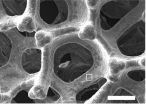Complete angioplasty safe for certain heart attack survivors
Proactive follow-up procedure may reduce future angioplasty or bypass
2015-03-17
(Press-News.org) SAN DIEGO (March 16, 2015) -- Patients who experience the deadliest form of heart attack--ST segment elevation myocardial infarction (STEMI)--and suffer from substantial narrowing in multiple heart arteries may benefit from receiving angioplasty in constricted arteries not affected by the heart attack, thereby reducing the need for future angioplasty, according to research presented at the American College of Cardiology's 64th Annual Scientific Session.
The study is the largest prospective, controlled trial to evaluate whether patients should receive preventive angioplasty, also known as complete revascularization, after receiving emergency angioplasty in response to a heart attack. A total of 627 STEMI patients in Denmark who survived an initial angioplasty procedure were randomized to receive either standard follow-up care or complete revascularization two days after the emergency procedure.
After an average of 27 months, 17 percent of the patients who received standard care returned for unplanned angioplasty or bypass surgery compared to only 5 percent of the patients who received complete revascularization. Rates of heart attack and death were comparable between the two groups.
Of the patients who returned for unplanned angioplasty, more than 40 percent of patients in both groups were considered urgent revascularizations.
"Our results show that it is safe to do a complete revascularization in this particular patient population," said Thomas Engstr&ostroke;m, M.D., Ph.D., senior consultant at the University of Copenhagen and the study's lead author. "We think this approach should be implemented in the guidelines, as it may help patients avoid returning for future angioplasty in an urgent manner."
While this approach was found to reduce the likelihood of unplanned angioplasty or bypass, the study authors were surprised to find there were no significant differences in rates of death or repeat heart attacks.
"The neutral impact from complete revascularization on death and repeat heart attacks is informative for physicians [because] if their patients have other risk factors, like poor compliance with dual antiplatelet medical therapy or a need for complex angioplasty that may lead to unsuccessful results, a more conservative approach can be taken without increasing the risk for death or heart attacks," he said.
Each year nearly 250,000 Americans experience STEMI, a severe form of heart attack that requires immediate angioplasty and is caused by prolonged blockage of blood supply in the heart. About 40 percent of STEMI patients are found to have narrowing of other coronary arteries in addition to the one with the blockage that caused their heart attack--a condition called multivessel disease. Multivessel disease can substantially increase the risk of death and other cardiac events, such as repeat heart attacks or need for urgent angioplasty. According to the study authors, there is no consensus regarding treatment of multivessel disease; therefore, approaches to reduce the risk are needed.
Angioplasty is a non-surgical procedure in which a balloon is fed into the blood vessels through a catheter and inflated to open narrowed or blocked arteries, allowing blood to flow. A stent is often placed at the site of blockage to open the artery. If the blockage is too severe, a patient will undergo heart bypass surgery to replace damaged arteries with blood vessels from another area of the body.
The trial, which took place in Denmark, included patients who underwent successful angioplasty for STEMI and had multivessel disease with narrowing of at least 50 percent, as well as a fractional flow reserve of less than 0.80 measured with a guide wire-based procedure that can accurately measure blood pressure and flow through a specific part of the coronary artery.
The results add to mounting evidence showing preventive revascularization to be beneficial in certain patients. Current U.S. guidelines recommend a more gradual approach in which angioplasty is performed once patients begin to experience symptoms related to multivessel disease.
Engstr&ostroke;m said research is needed to look into whether or not complete angioplasty can be conducted earlier than two days post-STEMI. The researchers' rationale for this timeframe--two days after the initial procedure--was to let the patient's body recover and to allow for more accurate identification of arteries in need of angioplasty.
INFORMATION:
The study was funded by the Danish Agency for Science, Technology and Innovation and the Danish Council for Strategic Research.
The ACC's Annual Scientific Session brings together cardiologists and cardiovascular specialists from around the world each year to share the newest discoveries in treatment and prevention. Follow @ACCMediaCenter and #ACC15 for the latest news from the meeting.
The American College of Cardiology is a 49,000-member medical society that is the professional home for the entire cardiovascular care team. The mission of the College is to transform cardiovascular care and to improve heart health. The ACC leads in the formation of health policy, standards and guidelines. The College operates national registries to measure and improve care, provides professional medical education, disseminates cardiovascular research and bestows credentials upon cardiovascular specialists who meet stringent qualifications. For more information, visit acc.org.
ELSE PRESS RELEASES FROM THIS DATE:
2015-03-17
OAKLAND, Calif. -- Specific system-level factors controlled by health care systems - including prescriptions with a medication supply greater than 90 days, mail-order pharmacy use, and lower copayments and out-of-pocket maximums - nearly doubled the likelihood that patients adhered to prescribed heart and diabetes medications, according to a new study published in the journal Medical Care.
"This study is the first to look at all four of these system-level factors at once in the senior population," said Julie A. Schmittdiel, PhD, research scientist with the Kaiser Permanente ...
2015-03-17
If you're a fan of food television, it's fine to be entertained by the programming, but if you take recipes for the rich meals the networks favor into your own kitchen, you're at risk of putting on pounds, according to a study just published online by the journal Appetite.
"The message is clear," said Lizzy Pope of the University of Vermont, the study's lead author. "Food TV should be a viewing experience only, not a cooking experience."
The study asked 501 women, aged 20 to 35, where they obtained information about new foods, how frequently they cooked from scratch, ...
2015-03-17
Healthy bone is continuously involved in a dynamic process that includes bone deposition and bone resorption. However, when a person has cancer that spreads to the bone and bone marrow, the tissue becomes increasingly fragile, and this process is disrupted, usually leading to increased bone resorption.
In an early online edition in advance of publication in the International Journal of Cancer, investigators at Children's Hospital Los Angeles reported a surprising discovery - when neuroblastoma (NB) cells metastasize to the bone, there initially occurs an increase in bone ...
2015-03-17
Berkeley -- Engineers at the University of California, Berkeley, are developing a new type of bandage that does far more than stanch the bleeding from a paper cut or scraped knee. Thanks to advances in flexible electronics, the researchers, in collaboration with colleagues at UC San Francisco, have created a new "smart bandage" that uses electrical currents to detect early tissue damage from pressure ulcers, or bedsores, before they can be seen by human eyes - and while recovery is still possible.
"We set out to create a type of bandage that could detect bedsores as ...
2015-03-17
UNSW Australia scientists have developed a highly efficient oxygen-producing electrode for splitting water that has the potential to be scaled up for industrial production of the clean energy fuel, hydrogen. The new technology is based on an inexpensive, specially coated foam material that lets the bubbles of oxygen escape quickly.
"Our electrode is the most efficient oxygen-producing electrode in alkaline electrolytes reported to date, to the best of our knowledge," says Associate Professor Chuan Zhao, of the UNSW School of Chemistry.
"It is inexpensive, sturdy and simple ...
2015-03-17
Tuesday, March 17, 2015. Just like milk and many other foods, blood used for transfusions is perishable. But contrary to popular belief, new research shows that blood stored for three weeks is just as good as fresh blood - findings published today in the New England Journal of Medicine.
The large clinical trial provides reassuring evidence about the safety of blood routinely transfused to critically ill patients. Supported by the Canadian Critical Care Trials Group and countless nurses, blood bank technologists, transfusion medicine and critical care physicians, Drs. ...
2015-03-17
Ann Arbor, MI, March 17, 2015 -- Suicide is responsible for more than 36,000 deaths in the United States and nearly 1 million deaths worldwide annually. In 2009, suicides surpassed motor vehicle crashes as the leading cause of death by injury in the U.S. A new study published in the American Journal of Preventive Medicine analyzes the upward trend of suicides that take place in the workplace and identifies specific occupations in which individuals are at higher risk. The highest workplace suicide rate is in protective services occupations (5.3 per 1 million), more than ...
2015-03-17
(Chicago) - Just as humans will travel to their favorite restaurant, chimpanzees will travel a farther distance for preferred food sources in non-wild habitats, according to a new study from scientists at Chicago's Lincoln Park Zoo that publishes on March 17 in the journal PeerJ.
Chimpanzees at Lincoln Park Zoo prefer grapes over carrots. Previous research at the zoo provided that insight into food preferences. Now, a 15-month study, led by Lydia Hopper, PhD of the Lester Fisher Center for the Study and Conservation of Apes at Lincoln Park Zoo, suggests that the apes ...
2015-03-17
Toronto, ON (March 17, 2015) - A comprehensive study examining clinical trials of more than 95,000 patients has found that glucose or sugar-lowering medications prescribed to patients with diabetes may pose an increased risk for the development of heart failure in these patients.
"Patients randomized to new or more intensive blood sugar-lowering drugs or strategies to manage diabetes showed an overall 14 per cent increased risk for heart failure," says Dr. Jacob Udell, the study's principal investigator, and cardiologist at the Peter Munk Cardiac Centre, University Health ...
2015-03-16
A new study, "Global Dispersion and Local Diversification of the Methane Seep Microbiome," provides evidence methane seeps are habitats that harbor distinct microbial communities unique from other seafloor ecosystems. The article appeared in the March 16 issue of the Proceedings of the National Academy of Sciences (PNAS).
Methane seeps are natural gas leaks in the sea floor that emit methane into the water. Microorganisms that live on or near these seeps can use the methane as a food source, preventing the gas from collecting in the surrounding hydrosphere or migrating ...
LAST 30 PRESS RELEASES:
[Press-News.org] Complete angioplasty safe for certain heart attack survivors
Proactive follow-up procedure may reduce future angioplasty or bypass



